#but nothing hits like tasteful artistry of a crime scene to me
Explore tagged Tumblr posts
Note
hello tumblr user sleepy stitches why am i willing to die for ur yuri ocs despite only having seen one line of dialogue from both of them?
sincerely, me
hi tumblr user verysharpfish,
thank you for writing in. at the top of this post i would like to clarify that pahrsi was made by my good friend rye beans, so i cannot at all take credit for her. ariane is my girl though. i would love to blend her. she sucks.
to answer your question, i think it is because they are both completely fucking insane. the dialogue in question is one i picked because i think it's wild out of context, but it stays equally insane in context? this exchange happens maybe two hours after they've met, after pahrsi has stitched up a particularly icky wound ariane has in the back of her leg (obtained from other yuri. thats a story for a different post though). they literally met at a casino and pahrsi talked ariane into taking her back to her place to stitch her up. as a complete stranger. because she thought it would be fun. i need to send her to the shredder.
the whole reason they find themselves drawn to each other in the first place is because they both have girlfriends that they have kind of rocky relationships with, and they remind each other of those girlfriends. it's kind of a weird rebound situation except if they never did anything explicitly romantic and instead just kind of danced around the fact that they're obviously attracted to each other for like two entire years. they make me fucking crazy.
oh and every exchange they have is equally insane. they always talk like this. im struggling to pick my favourite one to add at the end here because all of it is really really good. i think this one is a classic; this is barely a third of the conversation these two have about ariane's potential to kill pahrsi.
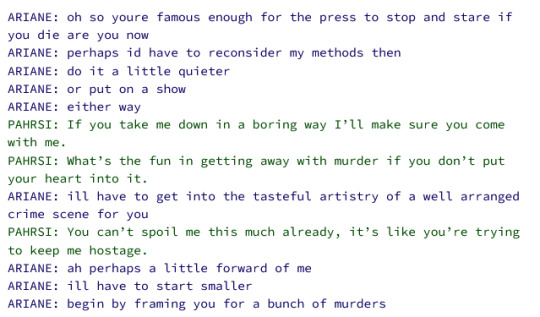

what the FUCK is wrong with them
#this is a really really basic overview of how they met and covers basically nothing about why they continue to make me insane#because this is like twenty years in the past and theres a lot going on in the present to make me crazy#but hey gotta start somewhere. idk its like i loooove to talk about these guys. i do. i would love to talk about them forever#but it is soooo much easier if i have like. Directed Questions its kind of hard to unravel their whole deal off the top of my head#all this to say this was fun . bats my eyes at my darling followers you should all ask more#you could even ask about my ocs that are pahrsi's sort-of-kids. theres a whole story there. though less insane than the yuri#arianwyn#pahrsi#13 orphans#placeholder ask tag#verysharpfish#other contenders for dialogue at the end here were secret blackjack and the holes innuendo#but nothing hits like tasteful artistry of a crime scene to me#sure hope the colour coding doesnt suck here but it means i dont have to restructure certain sentences to remove ambiguity so. lol#okay i think thats it thank you for showing interest in these freaks
5 notes
·
View notes
Text
Disco Elysium (2019) - A Review and Analysis
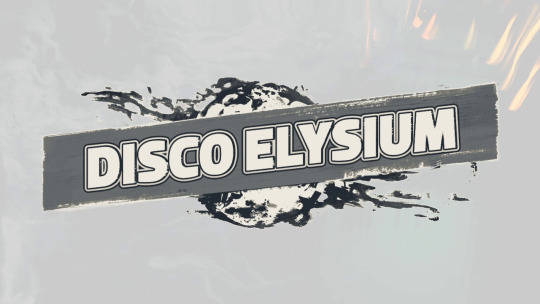
A postmodern role-playing game for a much different audience. A combination of skillful artistry and unfulfilled potential. An attempt at tackling difficult topics and pandering to different tastes. A full package, with deceptive contents...
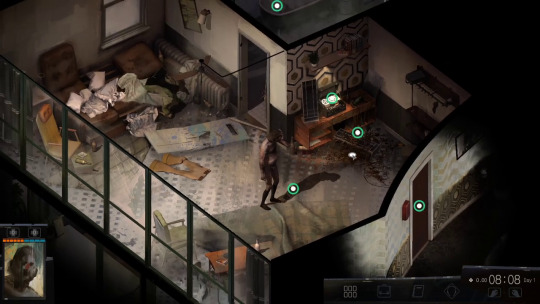
I enjoyed playing through Disco Elysium, but for completely different reasons than those that initially sold the game to me. Going in, I believed that it would be the type of RPG that I had been looking for quite some time – one that is not burdened by most of its interaction with the world happening on a grid, scanning through a list of spells and abilities, franticly pausing every frame, trying to min-max numbers as to not get destroyed by a pack of menacing farm animals of a slightly higher level. Examples of that in the genre would be classics such as Baldur’s Gate or newer re-iterations like Divinity: Original Sin and Shadowrun: Hong Kong. What I would habitually find myself doing is picking up the game, sinking my teeth into it, eventually hitting a numerical roadblock in some quest, and almost immediately retiring to a life of “not playing that game ever again”, as I am faced with the option of either save scumming and beating my head against the numeric wall, until by some fluke of the numbers I get the “good” number and am allowed to proceed; or could just stop doing whatever thing I am currently invested in and go somewhere else on the map, where the numbers are not as disagreeable, so I can get my personal numbers high enough to where the numbers I was having difficulty with before seem less impressive and I can pick up that quest again, but this time only halfway through, struggling to remember contextual cues that were relevant perhaps a few hours ago, but are now a forgotten footnote in some journal entry.
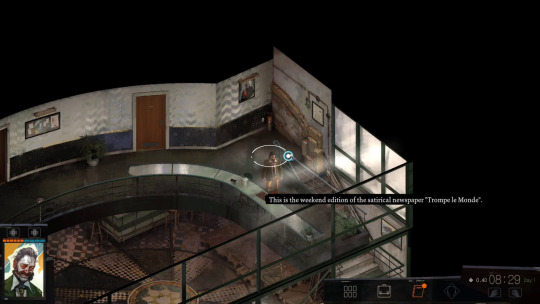
In both cases, the immersion gives way to the idea of gameplay, as the perhaps flawed ideal of an RPG is that which is based on table-top role playing games, such as Dungeons & Dragons, the aforementioned Shadowrun, or anything else that follows the same formula. From my personal experience in TTRPGs, the same issue persists, namely in having meaningful choice and character development take second fiddle to massive 3-5-man 1-2-hour combat encounters in between the more immersive moments of dialogue between players, non-player characters or story development. I’ve always felt that combat is so abstracted from everything else in TTRPGs in the way that it suddenly shifts into an entirely different game, which unlike the elements of role-play is less free-form and bound to a rigid set of rules. You’re no longer interested in how things look, feel or act, but rather how large a number is on a sheet of paper; and this contention of mine seems to always be translated into the video game counterpart of this genre, carrying the same problem from one medium to the other. Games even seem to compound upon the issue, by putting you in charge of multiple characters, where your custom created character is somehow not only equal to them, but at the same time the savior of the universe and all that is holy.
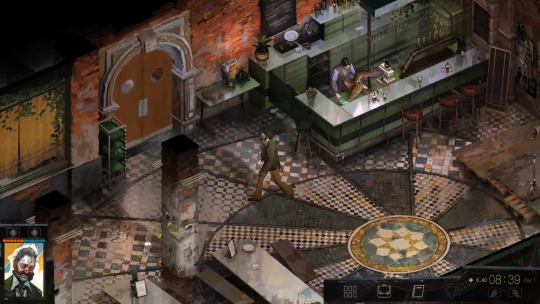
I cannot help but believe that the party ought to be AI controlled pawns, considering that they are supposedly different people with their own goals and aspirations; thus leaving the player to micro-manage their singular character – their avatar in the game world, rather than developing a form of psychogenic schizophrenia by having to deal with each and every one of the party’s members (now, admittedly the remakes of both Baldur’s Gate games have such a feature, but the combat AI is so poor, that you still have to go and remind them that they actually have a whole list of spells that they could be, in fact, using to… for instance, heal you, as you sit there bleeding profusely, crippled and powerless on the ground).
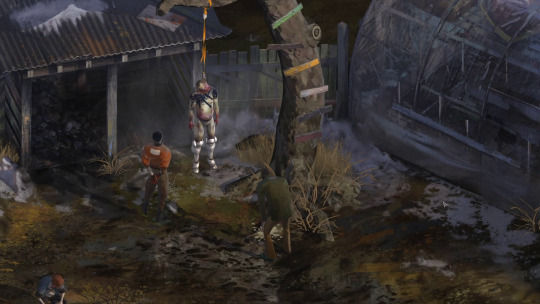
The only games which I have seen managing combat and RPG elements successfully are listed as a fundamentally different genre, known as “immersive sim” or “0451 games”. To name a few, that would be games like those of the Deus Ex, Dishonored and even the Fallout series. Most of those are first-person, for the most part shooters, with some emphasis on a singular character’s development through dialogue and stat point distribution. My main point can roughly be exemplified by comparing the naming convention and the reality for both genres: one is a “role-playing game”, the other is an “immersive simulation”; the first being used deceptively, as you could be playing a multitude of roles at any given time and also suspending that role-play to participate in some rather lengthy tactical combat for what could be 50% of the game’s runtime. On the other hand, you have “immersive sim”, which according to Warren Spector (game designer of Deus Ex and Thief fame) is a game in which “you are there, [and] nothing stands between you and [the] belief that you're in an alternate world”. I simply cannot emphasize enough how even the most engaging narrative and the most skillful writing can be tarnished by this type of abstract combat, which feels so fundamentally foreign and somehow still intrinsic to the idea of role-playing games and immersion.
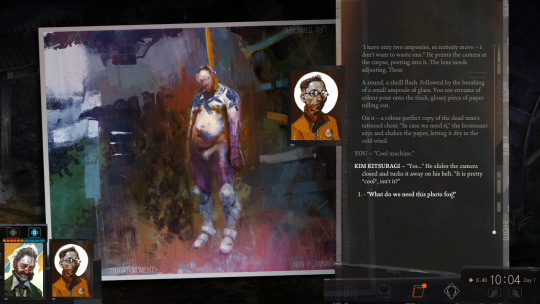
Disco Elysium seemed to be the odd one out – a RPG that has no combat, except that, initiated by your choices in dialogue (more akin to playing an animation than actual combat). It was also advertised to me as having quite an in-depth ideological system, that was affected by your choices in-game and would automatically adapt dialogue according to your flavor of politics, philosophy or culture through a series of thoughts, which you would internalize, if used often enough. Frankly, it seemed like wish fulfilment for a jaded immersion-loving straight-edge centrist such as myself.
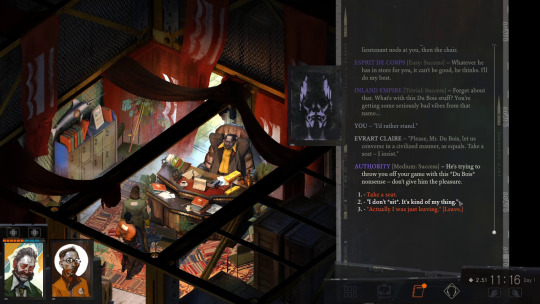
Upon launching the game, I was quickly introduced to the persona that I would be inhabiting – a deranged, drunken amnesiac, who in some cases would pass as a cop, but only if one’s notion of law-abiding is that of a drug-fueled abusive lover; also known as - the farthest thing from me. I already knew that my journey through the game would be that of a redemption arc, where this horrible piece of shit human, was going to become the most squeaky-clean, drug- and alcohol-free centrist known to all of Revachol. A true test of the game’s systems in action – from deranged and corrupt, to the straight and narrow. To my eventual surprise - I could do all of it, and very successfully at that. By the end of my nearly 24-hour playthrough, I had achieved my ideal vision for the character, with only a bit of resistance, which I will briefly mention further down the line. For now, I had succeeded in using all the tools available to me in order to internalize the thoughts for centrism, rejecting any form of drugs, and by the end almost managing to squeeze in the time to internalize being sober, cut short due to the spontaneous conclusion of the game.
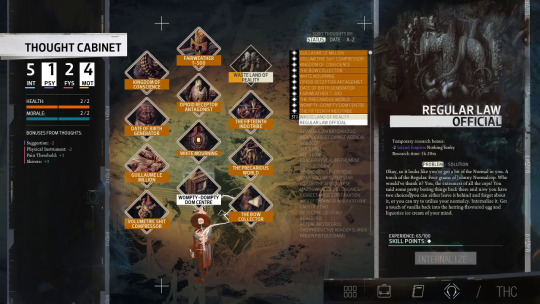
The thoughts system was not entirely what I had initially imagined. Namely, what I had envisioned was a system, which converts whatever responses one made throughout the game, into non-internalized thoughts, which would begin to alter the dialogue options available, and only after choosing to emphasize said options, would it eventually internalize and give you a lot more radical options based on said thought. What it would turn out to do instead is make the acquisition of thoughts work in a similar manner, but make the process of internalization a menu, in which you “equip” thoughts into available slots. It seems like a minor inconvenience, but it makes the thoughts feel like yet another item that you just set and forget, rather than the thoughts of a person being actively developed over time, based on what kind of discourse they engage in. I suppose the idea of having it take anywhere from thirty minutes to six hours to internalize is there to be the substitute for the drawn out process of internalization. It is in a way saying “I feel like turning into a centrist in the next thirty minutes.”, while going around doing investigative work around a crime scene. The more active process I envisioned, would indeed take a lot longer, but it would be massively more immersive, as more and more options become available to you over time, rather than after some arbitrary timer has gone down.
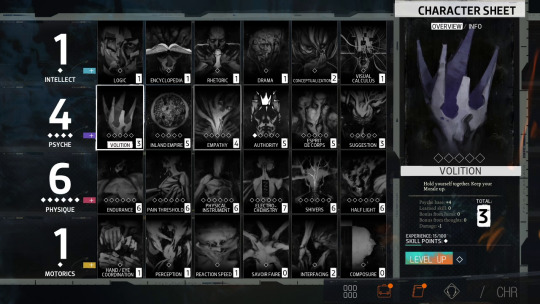
Another big detractor is having to use skill points to unlock new slots for thoughts, which would otherwise be put into your more practical skills. Theoretically, one would think a human has an almost infinite capacity for new ideas; and one is surely not going to want to internalize them all. A good example would be the “Volumetric Shit Compressor” thought you gain early into the game, which mainly fulfils its purpose in one skill check for less physically able characters as a part of a single quest and is never made use of again, beyond its flat stat bonuses. No other thought in my playthrough had a temporary pragmatic function like that, which feels like a missed opportunity. Its temporary nature is where the skill-point cost seems absurd, when they could be better used to improve one’s skills. In what way would the character becoming more skillful help them stop “getting their shit together”? Wouldn’t one discard the though immediately after it’s no longer useful? The way the system works currently, meant that I spent most of my points on slots and playing around with thoughts, rather than improving my character until the very last parts of the game, which in effect made the game more difficult than intended. The decision to make thoughts equipable and not persistent passive perks that can upgrade into more radical or complete versions of themselves is perhaps one of my main disappointments with the game. The effect on scope would be minimal, as the game already has the dialogue options for those thoughts written and would only need to change their acquisition and internalization to be less menu-driven and more player-driven.
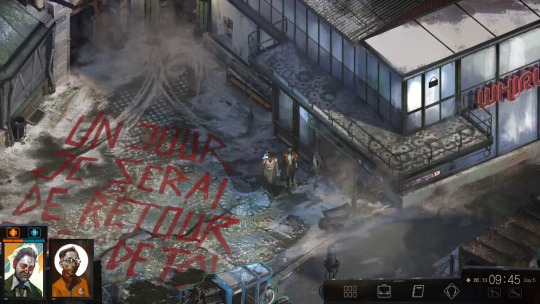
I tangentially mentioned not having skill-points to freely use until the latter parts of the game: That in turn made skill checks a lot more difficult and perilous, by making white skill checks (ones you can fail and retry upon increasing the skill they require) harder to re-unlock once failed and making red checks (ones that you cannot retry once failed) almost impossible, if not clothed in every stat-boosting piece of apparel in one’s inventory or seasoned with every potentially hazardous bottle of booze or glowing fairy dust left lying on the ground. White checks also do not unlock after one has used a consumable item or changed a piece of clothing to boost said stat, which encourages save scumming, as there is no way to change clothing in the middle of dialogue or knowing what the skill check will be, leading to one of the many pitfalls which I described earlier.
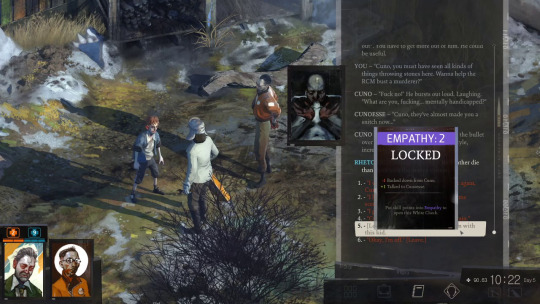
An even greater fault is that some quests just drop dead in their tracks, if the stat check is not completed. Moreover, since one cannot be proficient in all four skill categories, I would regularly hit a brick wall, upon being faced with a Psyche or Physique skill check, as my character mainly specialized in Intellect and Motorics. The thing about hitting a brick wall in Disco Elysium is not so much that you fail and have to face the consequences, but rather cannot continue at all and the narrative stops dead in its tracks until you can succeed the check. Sometimes quests are tied to each other, so not being able to progress in one of them means that you can’t progress in any of them. Suddenly an entire quest chain can just be gone at the click of a button. It got to a point where I would prefer to hear that all my efforts were in vain, fucking everything up irreversibly, rather than having a white check get locked and sit there in my journal, waiting for me to miraculously gain five points in some sub-skill of Physique. One way to fix this would be to have more obfuscated red checks with uncertain odds that lead to failure states. At least that would be more immersive than the current offering, as one could live with the consequences, rather than be left guessing what it could have been if one had slightly higher skills. This, however, could be difficult, as there is a dice roll to every skill. Not being skilled merely means you have less of a chance of succeeding or, alternatively, a higher chance to fail and lock the skill check.
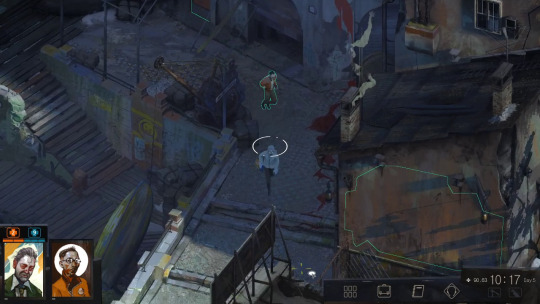
The one thing that the game does great when it comes to skills is the addition of secret tasks. If one were to follow particular lines of inquiry, they often lead to some skill check down the line becoming easier, due to the things learned beforehand about that topic. This system rewards being thorough and attentive and is, perhaps, the best feature of the game. However, observations made through the “shivers” system (where orbs of information will show up contextually above the protagonist’s head, revealing information about the environment or elaborating on something relevant) do not appear to factor into these skill checks. This often leads to you reading something important when it pops up in the overworld, but upon engaging someone in conversation one must often select benign lines of dialogue, acting like one hadn’t made those observations to begin with. The dissonance is even more infuriating whenever Kim (your companion throughout the game) tells you that you are obviously wrong, because he also made those observations but (unlike you) could talk about them. It would have been a lot more diegetic if there were dialogue options available for you to repeat the observation to Kim instead, perhaps as you talk to him in the overworld (a feature that is woefully underutilized, and shows the same five or so options throughout the entire game, except whenever Kim wants to talk to you about something he deems relevant – an ability, which you would think the player should have had as well).
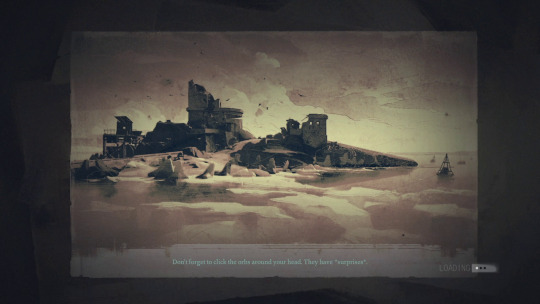
Speaking of the overworld, Disco Elysium does quite a lot with the small real-estate it has on its map. For what feels like a small neighborhood, it packs tens of hours of content, a varied cast of characters and lots of places to explore. Walking around is encouraged by the game, almost to a fault. At many points during the game Kim will remark upon your seemingly absurd ability to run around without getting tired. There even comes a point where you are injured, and are told not to run to avoid further harming yourself. After about twenty hours I realized that this was in order to signal to the player that if they run all over the place, trying to finish everything as quick as possible, they would be left with a lot of extra time at the end of the day, which would have been perhaps better spent looking into side-quests or other optional activities. However, the walk speed is woefully slow and with the amount of backtracking one needs to do, means that you will be seeing the same places plenty of times, which only tempts you even more to not waste your precious time RP-walking. The game has benches, which you can use to pass the time, but they are only available whenever Kim is not with you, which is only durring the night, meaning you can’t make any meaningful progress by resting on one, effectively making them worthless. That and the presence of time-gated tasks, means you will most likely be trying to find ways to waste your time, prompting Kim to berate you even more for straying away from the main focus of the narrative, as he often does. If you’re a fast reader, the game luckily fast-forwards time based on how many options you’ve selected, rather than real-time. This is most apparent whenever you’re save scumming and going though entire trees of dialogue you’ve already read.
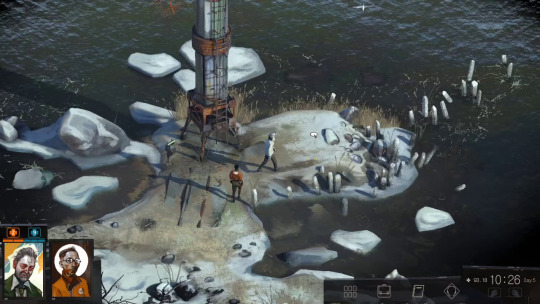
And you will be reading a lot, as this is what you signed up for when you relinquished the combat systems of your typical RPGs. A welcome change, I might add, as the dialogue is beautifully written and engaging for tens of hours. (The end credits even thank Chris Avellone for what is probably him lending a bit of his Midas touch when it comes to game writing.) However, there are of course flaws in the way Disco Elysium decides to portray some of its characters, as it is sometimes more interested in making political statements in a very one-note way that might shock some people, rather than what one would think are nuanced and fleshed out personas. A large part of the cast is wearing a thick layer of existentialism, which they seem to flaunt upon every given opportunity. The same goes for characters who clearly exhibit some variety of political radicalism; you’ve got your racist nationalist, your bourgeois-eating communist, your fence-sitting centrist (dubbed moralist) and a whole swath of colorful opinionated people whom you either interact with or endure. Everyone else is mostly pleasant to be around, if not a bit saddening, due to the overall melancholic way of life people of Disco Elysium are forced to lead, influenced by factors that they alone cannot control; an overall sense of futility present at every turn. Most of them have quirks that help them cope with their predicament, which you can explore in full detail through in-depth dialogue trees, leading to some intriguing interactions and ultimately some interesting consequences down the line. Every line of dialogue seems to have a lot of those, which is surprising for a game that so haphazardly makes you select dumb questions for answers you already know. An example of that is the one occasion in which I used a particular brand of alcohol to boost my “Pain Threshold” in order to open a certain mission-critical freezer. Which towards the end had Kim labeling me as someone who “drinks on the job”, even after becoming sober and internalizing the thought that removes all positive effects from alcohol, as well as the action leading to us retrieving an item, which we would later use to further the plot. Instead as a one-off sacrifice of one’s principles, it was seen as a major transgression that would only lead people into thinking of me as even more of a raging alcoholic, rather than someone who is trying to recover and “get their shit together”, as it were.
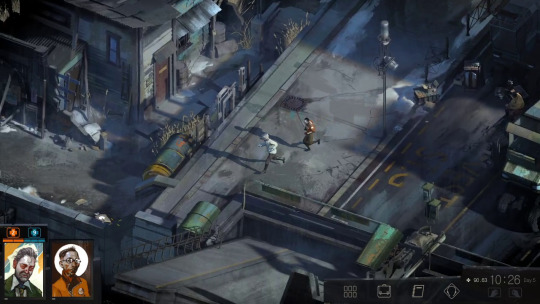
A major part of the game’s rhetoric is lost to those who do not have a dictionary that has been well tempered through copious forms of political jargon, coming from a various selection of manifestos, academic political analyses and some of the more famous philosophical works for the last century. I would go as far to say that some of the sentiments the game presents are absolutely impenetrable when it comes to wording. I’ll give you an example:
Heartache is powerful, but democracy is *subtle*. Incrementally, you begin to notice a change in the weather. When it snows, the flakes are softer when they stick to your worry-worn forehead. When it rains, the rain is warmer. Democracy is coming to the Administrative Region. The ideals of Dolorian humanism are reinstating themselves. How can they not? These are the ideals of the Coalition and the Moralist International. Those guys are signal blue. And they're not only good -- they're also powerful. What will it be like, once their nuanced plans have been realized?
If you immediately recognized that it was about centrism, then congratulations – you are a lot smarter than me and probably everyone else around you. For you Disco Elysium is the perfect college-level textual experience for your Tuesday-night 1960’s poetry club. For the rest of humanity, it’s a bunch of gibberish. Flowery prose and poetics are riddled everywhere and you're never really sure what you're doing, what thoughts you're thinking or what's happening to you.
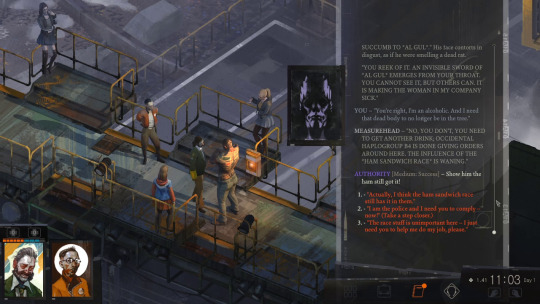
I mentioned briefly that the game tries to depict centrism as a form of moralism (a term which it prefers over the former). Even so, it presents centrism as less of an effort to hold multiple perspectives and act with a full and informed range of understanding, but rather as the stereotypical “fence-sitting” argument, where no decision can be made now, and progress can only be obtained through a slow, incremental process. While on the surface, it would seem so – as a self-proclaimed and passionate centrist, I cannot help but disagree with the outsider view that the game seems to be promoting, favoring critique of the right and an emphasis towards the left side of the political compass (making small but insignificant jabs towards both throughout). Contextually, the game’s developers Studio ZA/UM, have displayed a clear favor of the political left in their public appearances, which may explain this somewhat skewed perspective. While it’d be lovely to go on about the politics of ideology, it’s better not judge the contents of the game based on the developers’ ideological affiliation, but rather on its own merits.
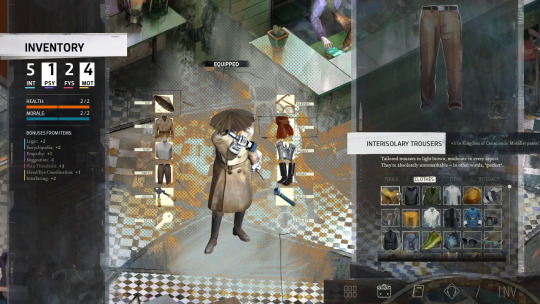
Considering the amount of reading one needs to do, I would hesitantly say that Disco Elysium is part RPG, part choose-your-own-adventure visual novel. I say RPG, because of the aforementioned brick walls, inhibiting progress in a way that no immersive sim ever would, as there would be multiple ways to get the same information, which is sadly not a thing Disco Elysium does well. The sheer volume of the text is also a cause for some, I would suppose, aesthetic concerns about the game. Graphically, the game is stunning with its unique painterly style, but it often values it over function, namely in having the UI serve little to no purpose, as Kim and your portraits take up the entire bottom left of the screen. At the same time the dialogue panel is put on the far right side of the screen, even though two thirds of it are spent zoomed in on some 3D models doing their idle animations, instead of having the text front and center, as the thing you will be most likely looking at for 90% of your time with the game. Other technical issues include shadows being displaced from where they should be, especially on stairs, as well as being incredibly jagged for a game that doesn’t really have high hardware requirements and very little real-time lighting, but all of this is frankly unintrusive, compared to the cramps in your neck from looking to your right all the time.
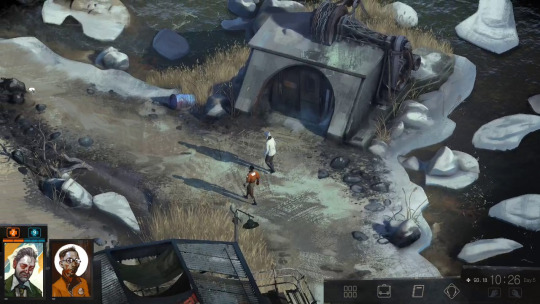
Every once in a while, you get to enjoy not having to read, as a select few scenes are entirely voice-acted by a talented cast. I am unsure, however, of the production team behind the recordings, as they seem to sound as if recorded in home studios with different microphones and sound processors. Other than that, the quality and range of the performances is wonderful, especially since it is coming from some lesser known actors in the industry.
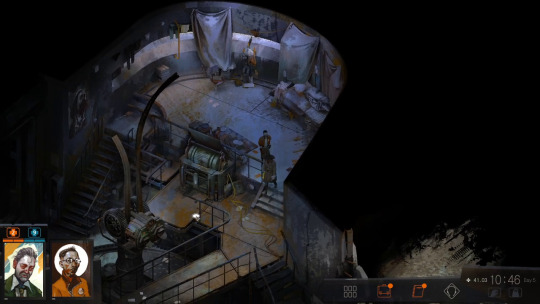
When it comes to sound, the game does a fantastic job of establishing a lot of varied soundscapes for an admittedly small plot of land. The music is ambient, droning and subtle in all the ways that make you not think about it, until you are sitting there listening to the soundtrack on your own time, remembering all the scenes that every piece of music has lifted from monotony. All of the tracks have this aging, somber tone to them, much like the world they are written for, making the music an unavoidable essential part of the experience, as you walk the fields of Revachol with the wind blowing and the small creek near you emitting a slight babble. The only downside is that the mixing of all these layers is often horribly unproportioned. Everything will be quiet, until some random intercom plays two straight minutes of loud white noise into your ear. Those parts are few and far between, but still leave a surprisingly large impression for an otherwise spotless execution of foley and ambience.
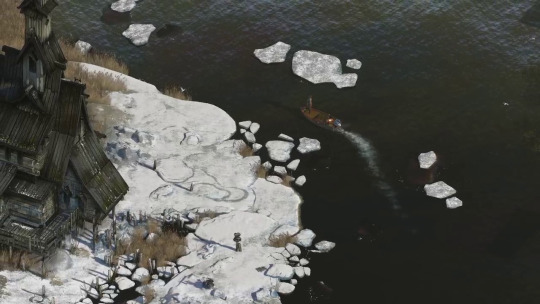
Overall, Disco Elysium is a full package. While not necessarily the game that I hoped it would be, it was still an enjoyable experience with an incredible main quest, memorable characters and side quests, elevated by wonderful sound design and fantastic ambient music, with writing that will be unparalleled for years to come. While it is not without its flaws, and some of them are quite major - it does what it set out to do with flying colors and is sure to appeal to a lot of people, who have been looking for an experience such as this. For me, however, it also represents a lot of squandered potential. It is by no means an ideal game – far from it; but I would still recommend you play through it for yourself, just to see where it takes you. It has a way of challenging you intellectually, that not a lot of games can pull off, especially nowadays. It is an admirable endeavor in tackling difficult topics, whilst also spinning an intriguing narrative that keeps you invested until the very end.
Score: 7/10
#game review#review#disco#elysium#disco elysium#harry du bois#kim kitsuragi#game analysis#game design#narrative#analysis#essay#revachol#oranje#politics#thoughts#systems#mechanics#game mechanics#RPG#visual novel#immersive sim#TTRPG#singleplayer#adventure#spoiler free#no spoilers
8 notes
·
View notes